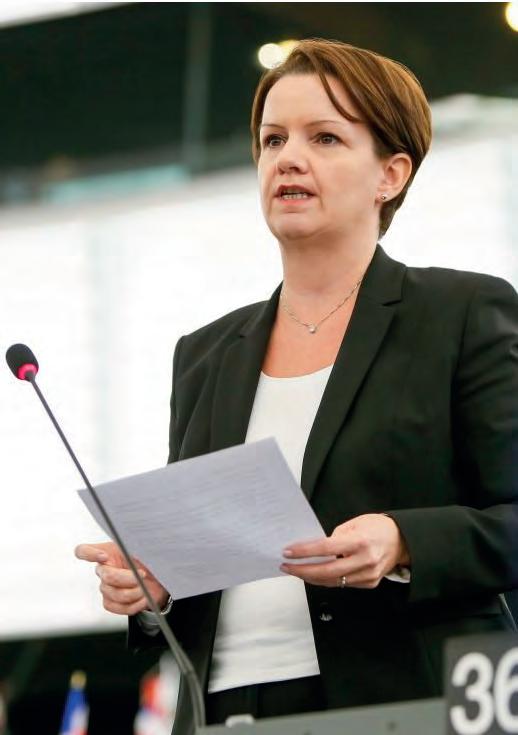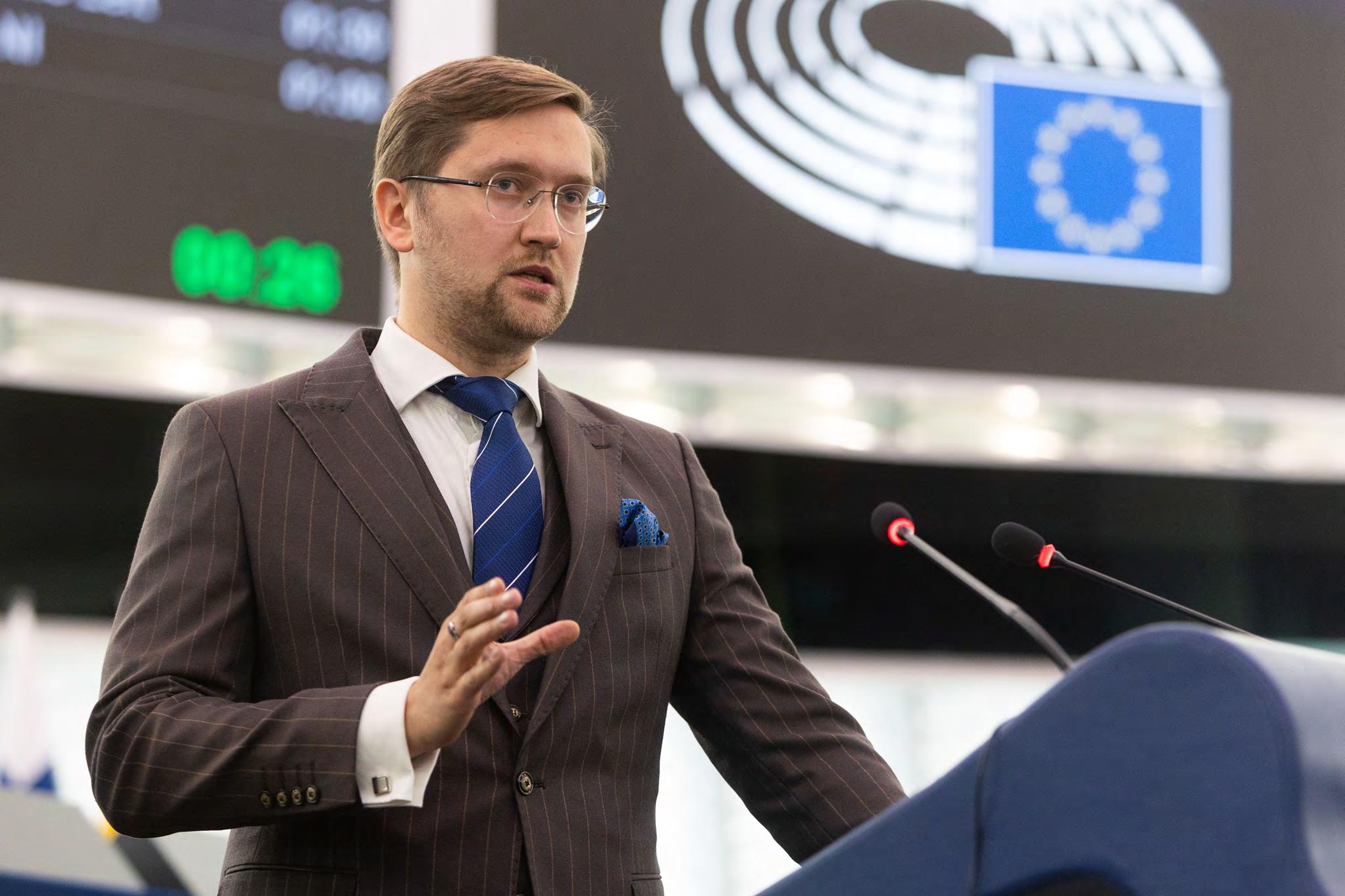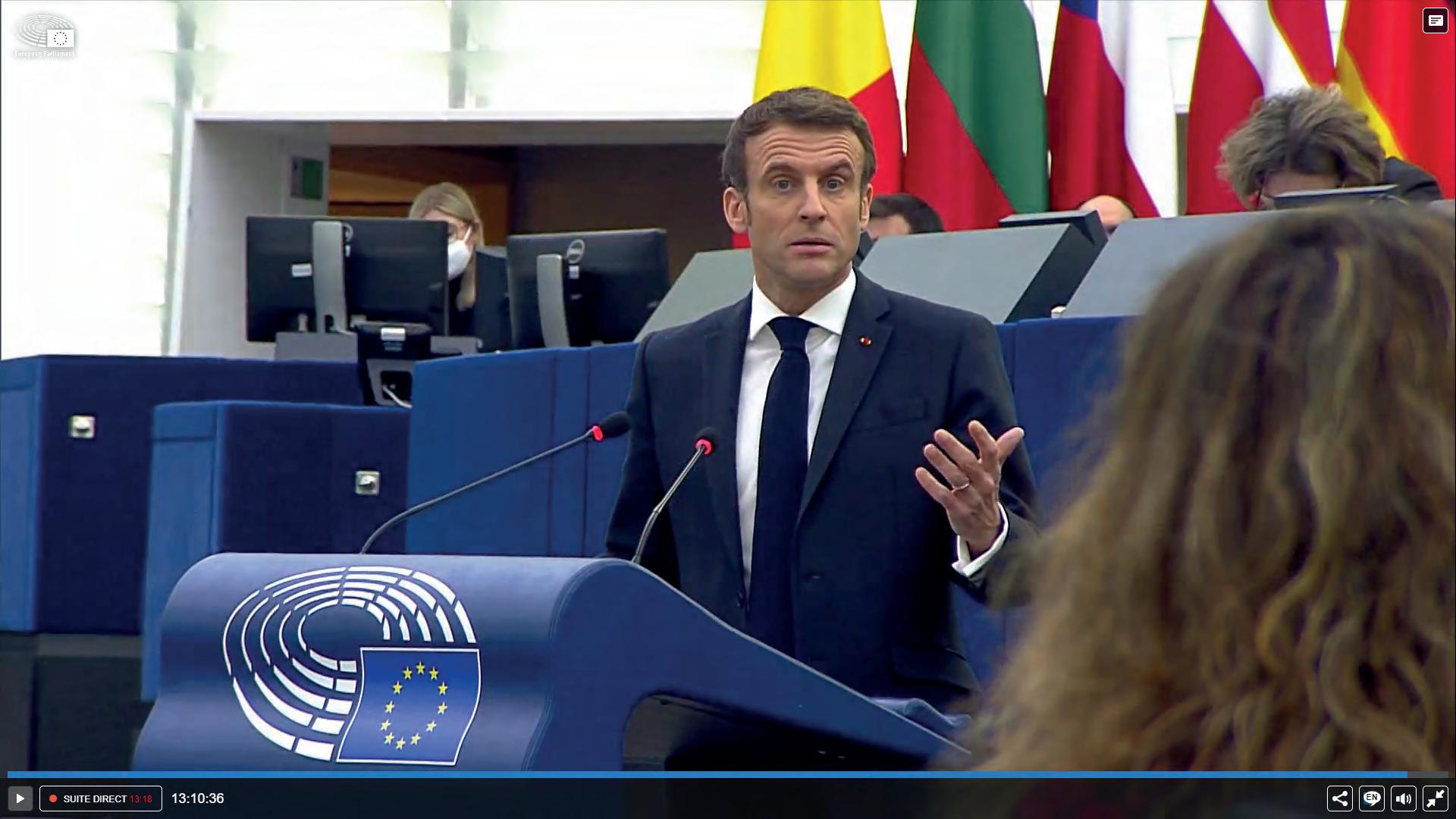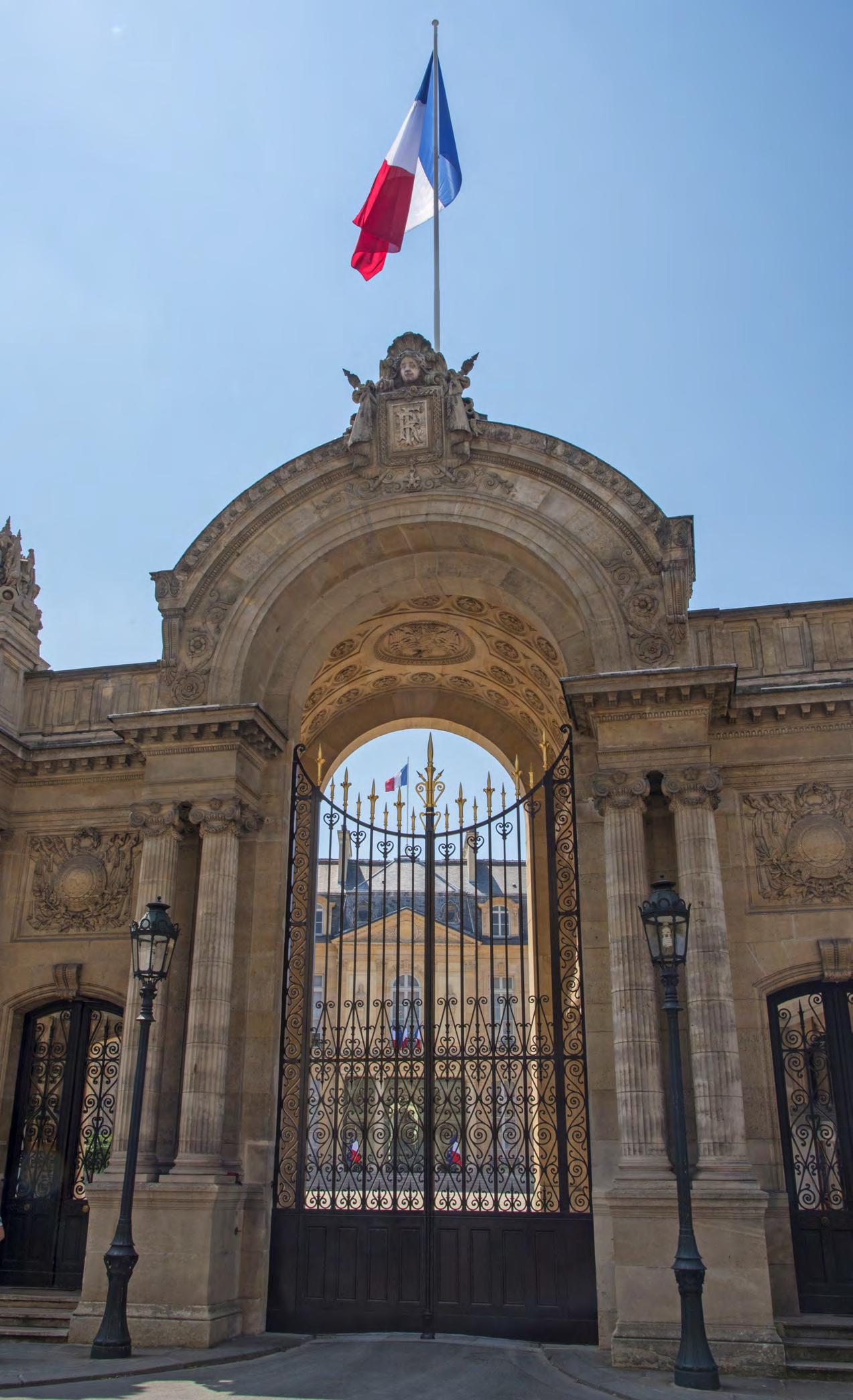
14 minute read
La Conférence sur l'Avenir de l'Europe, une mascarade fédéraliste
Advertisement
Few European citizens have heard of it, but the Conference on the Future of Europe was nevertheless announced with great fanfare by the European Union authorities. e barely-concealed objective is to continue the European Union's headlong rush towards greater federalism. Several members of the ID Party are defending you: Hélène Laporte (France), Catherine Griset (France), Philippe Olivier (France), Mara Bizzotto (Italy), Alessandro Panza (Italy), Susanna Ceccardi (Italy), Gerolf Annemans (Flanders), Jaak Madison (Italy), Ludovit Goga (Slovakia), and Petra Steger (Austria)
e EU has selected ten themes for debate: climate change and the environment; health; a stronger economy, social justice and employment; the EU in the world; values and rights, rule of law and security; digital transformation; European democracy; migration; education, culture; youth and sport.
If the gures are to be believed, it’s a total failure. In total, 38,000 people participated (out of 450 million inhabitants), often leaving a brief message at most. On the topic of migration, barely 500 citizens gave Peu de citoyens européens en ont entendu parler : la Conférence sur l'avenir de l'Europe a pourtant été annoncée en grandes pompes par les instances de l'Union européenne. L'objectif, à peine caché, est de poursuivre la fuite en avant de l'Union européenne vers plus de fédéralisme. Plusieurs membres du ID Parti vous y défendent : Hélène Laporte (France), Catherine Griset (France), Philippe Olivier (France), Mara Bizzotto (Italie), Alessandro Panza (Italie), Susanna Ceccardi (Italie), Gerolf Annemans (Flandre), Jaak Madison (Italie), Ludovit Goga (Slovaquie), Petra Steger (Autriche).
L'UE a sélectionné dix thématiques à soumettre à débats : changement climatique et environnement ; santé ; économie plus forte, justice sociale et emploi ; l'UE dans le monde ; valeurs et droits, état de droit et sécurité ; transformation numérique ; démocratie européenne ; migration ; éducation, culture ; jeunesse et sport.
Un échec total, si l'on en croit les chi res. Au total, 38 000 personnes ont participé (sur 450 millions d'habitants), laissant souvent au plus un message laconique. Sur le thème migratoire, à peine 500 citoyens ont
their opinion, often leaving an anti-migration message.
It seems a long time ago that the Conference was launched with such great fanfare, when for example a convinced federalist called for two ags to be own at the Olympic Games: the national ag and the twelve stars.
e very organisation of the debates is a joke. e European Parliament is represented and each country sends representatives from its national parliament. e allocation of speaking time is left to the discretion of the administration. During the last plenary, a Member of the European Parliament from the Identity and Democracy Party was given time to speak on the important subject of the digital transition, but was not chosen by the representative in question. e citizens' panels seem to be hand-picked to ensure that the discourse never deviates from o cial thinking.
Conclusions will be drawn from this mess, which we can already con dently predict right here and now: we will need more and more Europe and federalism. e Identity and Democracy Party will never subscribe to such a vision, as it favours sovereign peoples and national identities.
While at the beginning we were optimistic, we were quickly disillusioned and had to face the fact that this Conference was a farce. donné leur avis, laissant souvent un message opposé aux migrations.
Il semble loin le temps du lancement en fanfare de la Conférence, lorsqu'un fédéraliste convaincu en appelait, par exemple, à arborer deux drapeaux lors des Jeux olympiques : l'étendard national accompagné des douze étoiles.
L'organisation même des débats est cataclysmique. Le Parlement européen est représenté et chaque pays y envoie des représentants des Parlements nationaux. L'attribution des prises de parole est con ée au bon vouloir de l'administration. Lors de la dernière plénière, un député européen du Parti Identité et Démocratie s'est vu attribuer un temps de parole sur la transition numérique, sujet important, mais non choisi par le représentant en question. Les panels citoyens semblent triés sur le volet tant le discours ne s'écarte jamais de la pensée o cielle.
De ce micmac seront tirées des conclusions que l'on peut déjà tracer ici sans grand risque de se tromper : il faudra toujours plus d'Europe et de fédéralisme. Le Parti Identité et Démocratie ne souscrira jamais à cette vision-là, lui qui fait la part belle aux peuples souverains et aux identités nationales.
Si au début, nous étions optimistes, nous avons rapidement dû déchanter et nous rendre à l'évidence que cette Conférence était une mascarade.
Mara Bizzotto: « Ce dont nous avons besoin aujourd'hui, c'est de construire un nouveau modèle d'Europe, l'Europe des peuples... »
Mara Bizzotto is a Member of the European Parliament for Lega (Italy)
“ e Conference on the Future of Europe was a historic opportunity to rebuild Europe and design the Europe of tomorrow: it was an important chance that we had to seize, with the courage and foresight to make major changes, including the necessary reform of the European treaties.
We need to work together to change the current model of Europe at its roots, a model that has proved to be wrong and too far removed from the real needs of our citizens and territories, as we have also seen during the Covid emergency.
What we need today is to build a new model of Europe, a Europe of the people, of the citizens, of work and of true democracy, which will put a de nitive end to the Europe of austerity, of the banks and of this bureaucracy which has done so much harm to our countries in recent years.” Mara Bizzotto est membre du Parlement européen pour Lega (Italie)
« La Conférence sur l'avenir de l'Europe représentait une opportunité historique pour reconstruire l'Europe et concevoir l'Europe de demain : c'était une occasion importante dont nous devions pro ter, en ayant le courage et la clairvoyance d'opérer des changements majeurs, notamment par la nécessaire réforme des traités européens.
Il faut travailler ensemble pour changer à la racine le modèle actuel de l'Europe, un modèle qui s'est avéré mauvais et trop éloigné des besoins réels de nos citoyens et de nos territoires, comme nous l'avons vu aussi au cours de l'urgence du Covid.
Ce dont nous avons besoin aujourd'hui, c'est de construire un nouveau modèle d'Europe, l'Europe des peuples, des citoyens, du travail et de la vraie démocratie, qui mettra dé nitivement n à l'Europe de l'austérité, des banques et de cette bureaucratie qui a fait tant de mal à nos pays ces dernières années. »

Petra Steger: « Ma vision de l'Europe est une association de peuples libres et autodéterminés dans laquelle la diversité des cultures est perçue comme une force et non comme un obstacle... »
Petra Steger: “My vision of Europe is an association of free and self-determined peoples in which the diversity of cultures is seen as a strength and not an obstacle...”
Petra Steger is a Member of the National Council (Austria) for Freiheitliche Partei Österreichs and participates in the Conference on the Future of Europe
“A respectful and united cooperation according to the principles of subsidiarity and federalism should guarantee the freedom of each nation State.
On the other hand, I categorically reject the path towards a central EU political state, coupled with massive undesirable developments such as the debt and transfer union, EU taxes, losses of national sovereignty or accession negotiations with non-European countries such as Turkey. A return to the real tasks of the EU is needed, namely to ensure peace, freedom and prosperity. Petra Steger est membre du Conseil national (Autriche) du Freiheitliche Partei Österreichs et participe à ce titre à la Conférence sur l’avenir de l'Europe
« Une coopération respectueuse et solidaire, selon les principes de subsidiarité et de fédéralisme, devrait garantir la liberté de chaque État-nation.
En revanche, je rejette catégoriquement la voie empruntée vers un État politique central de l'UE, couplée à des développements indésirables massifs tels que l'union de la dette et des transferts, les impôts de l'UE, les pertes de souveraineté nationale ou les négociations d'adhésion avec des pays non européens comme la Turquie. Un retour aux tâches réelles de l'UE est nécessaire : assurer la paix, la liberté et la prospérité.
“I categorically reject the path taken towards a central EU political state”

Petra Steger (Autriche) députée au Conseil national Freiheitliche Partei Österreichs

However, the EU will only remain an order of peace if the components of security and freedom are not forgotten. is means nothing less than self-determination. But it is precisely this self-determination which is increasingly being lost as the EU continually seeks to take over national competences and transform itself into a centralised state. is is also leading to a growing rejection by the citizens. Europe is important, but it can never replace the Nation.” Cependant, l'UE ne restera un ordre de paix que si l'on n'oublie pas les composantes de la sécurité et de la liberté, ce qui ne signi e rien d'autre que l'autodétermination. Mais c'est précisément cette autodétermination qui se perd de plus en plus, alors que l'UE veut de plus en plus reprendre les compétences nationales et se transforme en un État centralisé. Cela conduit également à un rejet croissant de la part des citoyens. L'Europe est importante, mais elle ne pourra jamais remplacer la patrie. »
Jaak Madison: « Je ne suis pas optimiste quant à la viabilité à long terme de l'Union européenne »
Jaak Madison is a Member of the European Parliament for Eesti Konservatiivne Rahvaerakond (Estonia)
“When we speak of the future of Europe, it is important to remember that we are talking rst and foremost about the future of the European Union, not of Europe as a whole. Switzerland, Norway or Iceland are as European and often more so than any EU Member State or the European Commission. I am not optimistic about the long-term viability of the European Union.
e more the European Union tries to seize power and reduce the sovereignty of Member States, for example in environmental, economic, defence or foreign policy, the more likely it is that the Union will eventually collapse.
Unfortunately, the European Commission and the European Parliament have not been able to recognise the mistakes which led Britain, for example, to leave the Jaak Madison est membre du Parlement européen pour Eesti Konservatiivne Rahvaerakond (Estonie)
« Lorsque nous parlons de l'avenir de l'Europe, il est important de se rappeler que nous parlons d'abord et avant tout de l'avenir de l'Union européenne, et non de l'Europe dans son ensemble. La Suisse, la Norvège ou l'Islande sont autant européennes et souvent même plus que n'importe quel État membre de l'UE ou la Commission européenne. Je ne suis pas optimiste quant à la viabilité à long terme de l'Union européenne.
Plus l'Union européenne tente de s'emparer du pouvoir et de réduire la souveraineté des États membres, par exemple en matière de politique environnementale, économique, de défense ou étrangère, plus il est probable que l'Union nisse par s'e ondrer.
Malheureusement, la Commission européenne et le Parlement européen n'ont pas été en mesure de


Union. e future of the European Union is only possible if we return to the original roots of the Union, which are economic cooperation and the free movement of goods. is means abandoning federalist policies in areas which have absolutely no connection with free trade and economic relations.” reconnaître les erreurs qui ont conduit la Grande-Bretagne, par exemple, à quitter l'Union. L'avenir de l'Union européenne n'est possible que si l'on revient aux racines originelles de l'Union, qui sont la coopération économique et la libre circulation des marchandises. Cela signi e abandonner les politiques fédéralistes dans des domaines qui n'ont absolument aucun souci de libre-échange et de relations économiques. »
La Présidence française du Conseil de l'Union européenne en pleine campagne présidentielle : où est l'équité ?
e French Presidency of the Council of the European Union in the middle of a presidential campaign: where is the fairness?
Since 1 January, France has held the rotating presidency of the Council of the European Union, in accordance with the mechanism whereby each member country takes it in turn to hold the o ce.
Whether it’s a coincidence or not, it comes at the same time as the presidential campaign, allowing Emmanuel Macron to appear in the spotlight.
If we can ask ourselves the question of fairness in relation to the other candidates - including Marine Le Pen - we can hope that this European La France occupe depuis le 1er janvier la présidence tournante du Conseil de l'Union européenne, selon le mécanisme permettant à chaque pays membre d'occuper, à tour de rôle, la fonction.
Hasard ou non du calendrier, celle-ci intervient en même temps que la campagne présidentielle, permettant à Emmanuel Macron d'apparaître sous les projecteurs.
Si l'on peut se poser la question de l'équité par rapport aux autres candidats, dont Marine Le Pen, on peut espérer que cet intermède
interlude will be an opportunity for two visions of Europe to face o : on the one hand, the federalist project intending to make Europe the stepping stone to globalisation, and on the other hand, a national programme rooted in and respectful of identities.
For Emmanuel Macron has never hidden his intention to drown the French identity - in which he has never believed - in the European melting pot, to the point of speaking of “European sovereignty” and thereby sweeping away the very idea of national sovereignty. européen soit l'occasion de confronter deux visions de l'Europe : d'un côté, le projet fédéraliste entendant faire de l'Europe le marchepied vers la globalisation ; de l'autre, un programme national, enraciné et respectueux des identités.

Car Emmanuel Macron n'a jamais caché son intention de noyer l'identité française à laquelle il n'a jamais cru dans le magma européen, jusqu'à parler de « souveraineté européenne », balayant l'idée même de souveraineté nationale.
In concrete terms, France's powers will be increasingly entrusted to Europe, especially in military terms, since the current French president hopes to establish a common defence policy in both strategic and operational areas. In other words, the idea of a European army is never far o .
He will certainly be able to count on the support of the new German Chancellor Olaf Scholz, whom he has already met, and who has “great ambitions for Europe.” Germany has already announced its intention to “see the European Union evolve into a European federal state.” It is therefore to be feared that the Franco-German couple, the Sarkozy-Hollande/Merkel yesterday, the Macron/Scholz today, will continue to dismantle the national ideal. e French presidential election could change things: with Marine Le Pen in the Elysée, things would certainly take a turn for the better.
As a symbol, while France was preparing to take over the presidency of the Council of the European Union, the government in power had the French ag replaced by the European ag under the Arc de Triomphe, where the Unknown Soldier, who died for the country, is buried. It had to be removed after two days. “A patriotic victory,” according to Marine Le Pen. We can hope that she will announce another one in April! Concrètement, les pouvoirs de la France seront toujours plus con és à l'Europe, notamment en termes militaires puisque l'actuel président français espère mettre en place une politique de défense commune, tant dans les domaines stratégiques qu'opérationnels. En d'autres termes, l'idée d'une armée européenne n'est jamais bien éloignée.
Il pourra assurément compter sur le soutien du nouveau chancelier allemand Olaf Scholz, qu'il a déjà rencontré, et qui nourrit, pour l'Europe, « de grandes ambitions ». L'Allemagne a déjà annoncé son intention de « voir évoluer l'Union européenne vers un État fédéral européen ». On peut donc craindre que le couple franco-allemand, Sarkozy-Hollande/Merkel hier, Macron/Scholz aujourd'hui, ne poursuive le dépeçage de l'idée nationale. L'élection présidentielle française pourrait changer la donne : avec Marine Le Pen à l'Élysée, les choses se passeraient, forcément, di éremment.
Comme un symbole, alors que la France s'apprêtait à prendre la présidence du Conseil de l'Union européenne, le pouvoir en place a fait remplacer le drapeau français par le drapeau européen sous l'Arc de Triomphe, où repose... le soldat inconnu, mort pour la patrie. Il dut être retiré après deux jours. « Une victoire patriote », selon Marine Le Pen. Gageons qu'elle en annonce une autre, en avril.




